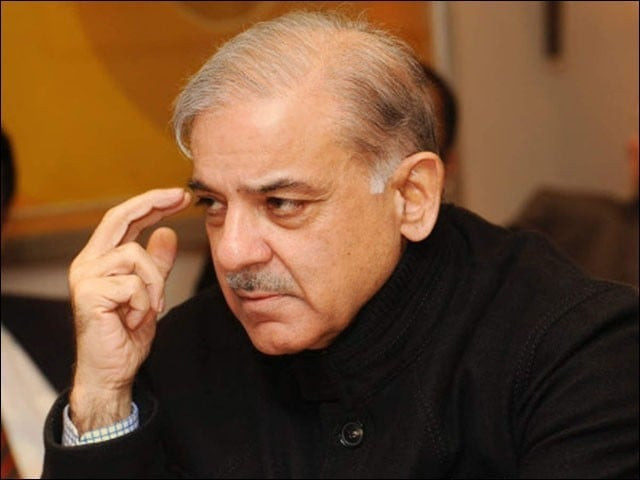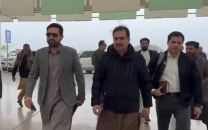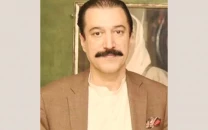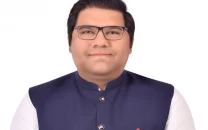PM’s ‘black sheep’ jibe hurts SC judges
Imran lists hurdles in seeking legal advice to CJ as larger bench takes ICAs on NAB tweaks

The Supreme Court justices on Thursday took exception to the remarks made by Prime Minister Shehbaz Sharif, labelling some among the judges as ‘black sheep’, saying the country’s top executive official should knock the doors of the relevant forums if he had complaints.
The remarks from the judges came as the top court took up the first-ever intra-court appeals (ICAs) against its Sept 15 majority judgement that declared amendments to the National Accountability Ordinance (NAO) as illegal.
The judges were referring to an address of the prime minister at an event organized in connection with the May 28 celebrations in which he was reported as saying: “You are Pakistanis; you are judges. If development does not return to Pakistan, then there will be no judges, no politicians, and no one else. Do you want this? I believe that most of these judges are Pakistanis and think about Pakistan’s development, but some ‘black sheep’ are helping [PTI founder] Imran Khan.”
Drawing a parallel between court proceedings at the time when PML-N President Nawaz Sharif was facing a hoard of cases and trials against PTI founder Imran Khan, the prime minister said when his elder brother was under trial, he would not get bail in his cases, and added that we had been informed of discussions in the judiciary about how the PTI founder could be bailed out and his cases dismissed.
The larger bench headed by Chief Justice of Pakistan (CJP) Qazi Faez Isa and comprising Justice Amin-ud-Din Khan, Justice Jamal Khan Mandokhail, Justice Athar Minallah and Justice Syed Hasan Azhar Rizvi took up two ICAs — one filed by the federal government and the other by former SSGCL managing director Zuhair Ahmed Siddiqui.
During the hearing, Justice Mandokhail, while interacting with Attorney General for Pakistan (AGP) Mansoor Usman Awan, observed that the prime minister had labelled the judges as ‘black sheep’.
“If you like the decision, then a judge is fine; but if you dislike the verdict, then a judge becomes black sheep,” Justice Mandokhail remarked.
Responding to the remarks, the AGP clarified that the prime minister did not label the “honourable judges” as black sheep. “This [black sheep remark] was not aimed at incumbent judges,” the AGP added.
Justice Minallah also expressed annoyance over the remarks, saying: “We are not black sheep [but] we are black hornets, so the prime minister can get the benefit of doubt.”
The judge also told the AGP to ask the premier to file reference against “black sheep” in the judiciary.
Breaking from its past proceedings, the Supreme Court allowed the incarcerated former prime minister, Imran Khan, to speak his mind.
Setting legal niceties aside, the former prime minister did not waste the opportunity to cast aspersions on the current political set-up.
At the outset of the hearing today, Justice Minallah said the hearing should be broadcast in the same manner earlier hearings were. However, the chief justice said the case is "technical" in nature and is not a matter of public interest.
"The last hearing was not broadcast live and neither will we broadcast today," added Justice Isa.
Following the remarks, the bench took a recess to deliberate if the hearing should be broadcast live.
The hearing resumed after a nearly hour-long break, with the court dismissing the K-P government's miscellaneous application by a majority of four to one. Justice Athar Minallah dissented from the decision.
At this point, government counsel Makhdoom Ali Khan began presenting his arguments. He contended that the NAB amendments were a part of the “government’s policy” and that “the judiciary cannot interfere in the Parliament’s powers”.
“I’ll speak about myself. I use social media and read newspapers. The prime minister said ‘black sheep’,” Justice Mandokhail said, in a likely reference to PM Shehbaz Sharif’s speech on May 28.
In response, AGP Awan clarified that the term was “not used for the current judges”.
Justice Mandokhail remarked, “The NAB law kept being applied to those who remained outside the government. Then when those same people come to power, the others get caught in NAB’s clutches.”
Justice Minallah asked what reasons had been stated in support of the argument that the amendments were against the Constitution. “There is mention of initiating cases, which were below the level of corruption set under the law, at other judicial forums,” he noted.
“Cases [of corruption] worth Rs500,000 were heard by the Balochistan High Court,” Justice Mandokhail highlighted.
“Parliament itself should decide whether to set short sentences or long. The Supreme Court can only review whether a law is Constitutional or not,” he added.
The top judge asked if suspects had been given benefits through the NAB amendments, to which Makhdoom replied in the negative, adding that the changes to the anti-graft laws had instead “specified the scale of the crimes”.
Justice Minallah then asked, “Did a few individuals’ punishments not end after the NAB amendments? Was Mian Nawaz Sharif’s sentence not nullified after making edits in section 9a(v) of the NAB [ordinance]?
He stated that the former premier’s case pertained to assets and changes were made in the provision about evidence. The amendments were made in light of previous SC verdicts, the judge observed.
CJP Isa asked if the K-P government could introduce the NAB law that the Parliament had amended, to which Makhdoom replied in the affirmative.
Read SC to hear NAB amendments case on May 30
“The provincial government of K-P can make laws on its own,” the top judge said. Justice Minallah then said that the K-P Ehtesab Commission Act was ended there due to losses.
The government counsel contended that PTI ministers “kept on holding press conferences and making statements against the NAB ordinance”. Justice Isa then replied, “Your arguments are easy that ‘make the minority ruling a majority one’.”
Makhdoom responded: “Even if the Parliament abolishes a punishment under a law, it has the power to do so. The Parliament can legislate to reduce the burden on the courts.”
He added that in a majority decision, the NAB was told to take action on corruption of up to Rs100 million, at which Justice Athar Minallah asked how the judiciary could decide the limit of corruption.
Highlighting that the minority decision had stated that “retired judges and generals should not be exempted from NAB law”, Justice Minallah asked the government counsel if he agreed with the opinion.
“My opinion is exactly the same, but the attorney general can give a better answer,” Makhdoom replied.
Justice Minallah recalled that in a case pertaining to former military dictator Pervez Musharraf, the Islamabad High Court had addressed NAB investigations.
“How can a judge be exempt from NAB laws? Why are we judges [considered] sacred cows?” he wondered, asserting that no one should be above the law.
Justice Mandokhail observed that judges were “not included in the definition of Service of Pakistan” but were rather held a Constitutional role.
When Imran was allowed to speak, CJP Isa asked him whether he would like to present his arguments himself or have Haris argue on his behalf.
The ex-premier then sought 30 minutes to present his arguments. “I was neither provided with material to prepare nor am allowed to meet lawyers. I am in solitary confinement,” he lamented.
The PTI founder, referring to the general elections held earlier this year, said the “biggest robbery was committed in the country on February 8”, terming it a “matter of life and death for the country”.
The chief justice then directed Imran: “Do not speak about this right now. We are currently hearing the NAB amendments case.”
Addressing the CJP, the former prime minister said, “Our two petitions related to human rights violations are pending before you.”
When asked who his counsel was in those petitions, Imran named Hamid Khan. “Hamid Khan is a senior lawyer. He had to go abroad, hence in one case, a date of his choice has been fixed for hearing,” the CJP noted.
Imran claimed, “Chief justice sahib, there is a one-window operation in the [Adiala] jail, which is being run by a colonel sahib. You may order him to allow my meeting with my legal team.
“They (jail authorities) do not let me meet my legal team. I am being kept in solitary confinement here. I neither have any material nor a library to prepare for the case,” he added.
“I wanted to meet lawyers previously as well but was not allowed,” Imran said.
Justice Isa then assured Imran that he would be provided with the required material and also allowed to meet lawyers, warning that if he sought a legal team’s services, his direct arguments would not be heard in the case.
“A legal expert’s assistance is vital for preparation. I want to meet Khawaja Haris and one or two other lawyers,” Imran insisted.
CJP Isa then stated that Haris could meet the ex-premier “whenever he wants”, adding, “Do not take 50 lawyers with you. One or two lawyers can meet the PTI founder when they wish.”
He also ordered that Imran be provided with the complete case records.
While Makhdoom had concluded his arguments in the case, Haris said he would require three hours to present his.
The hearing was then adjourned till the next week, with the chief justice saying that the date would be announced after reviewing the schedule.



















COMMENTS
Comments are moderated and generally will be posted if they are on-topic and not abusive.
For more information, please see our Comments FAQ